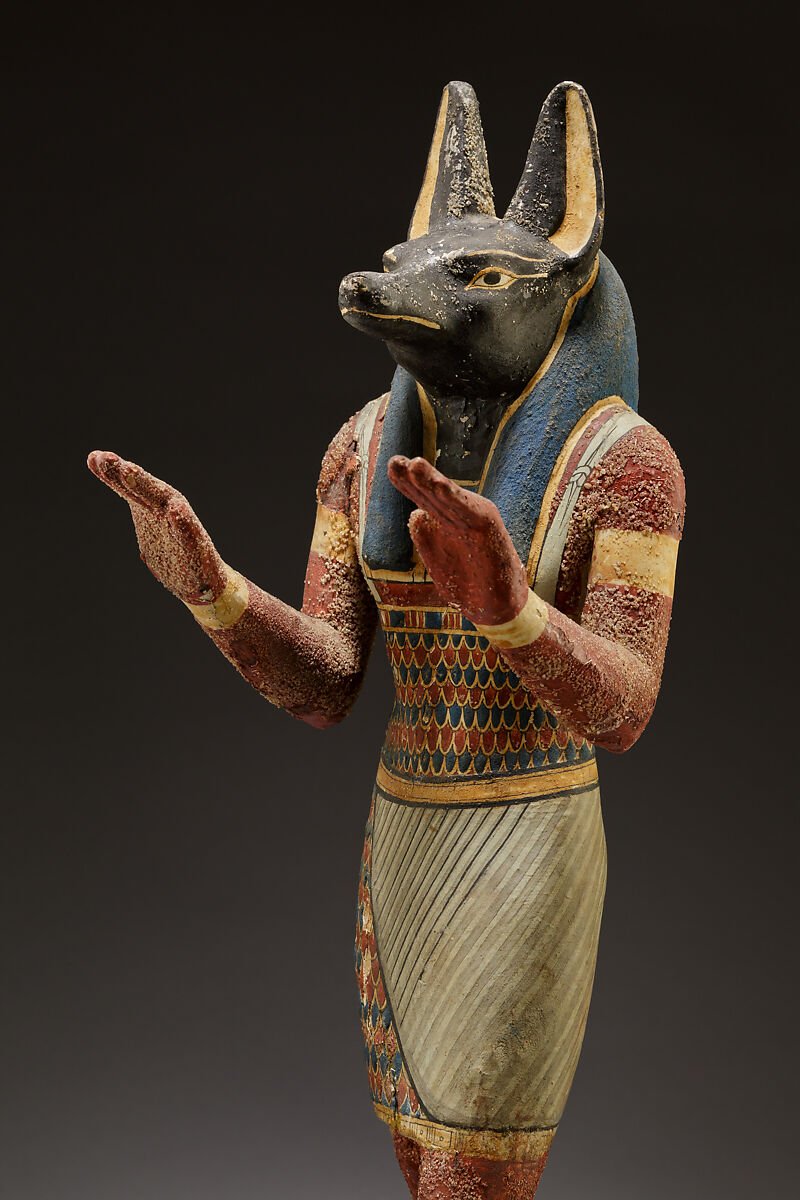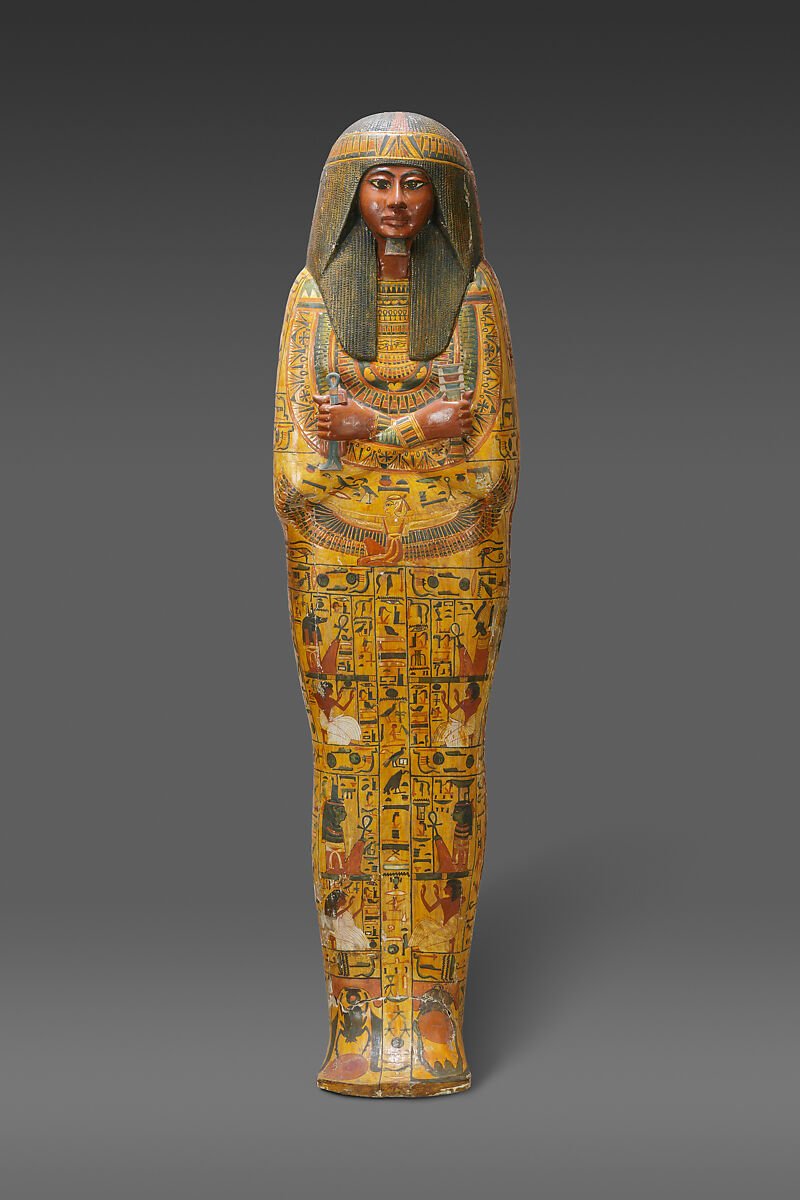 Image 1 of 3
Image 1 of 3

 Image 2 of 3
Image 2 of 3

 Image 3 of 3
Image 3 of 3




PAST CLASS Ancient Egyptian Mortuary Traditions with Egyptologist Ava Forte Vitali, Begins July 12
Taught via Zoom
Wednesdays July 12 - August 9
7 pm - 9 pm
$110 Patreon Members / $135 General Admission
Please note: All classes will be recorded for those unable to attend
If there is one thing that ancient Egyptians are known for today, it is their close relationship with death and the afterlife. While many are taught a basic grade school understanding of ancient Egyptian beliefs—from pyramids to mummies—their actual mortuary traditions, mythologies, and practices were much more nuanced and complicated.
This four-week class, taught by Archaeologist and art historian Ava Forte Vitali, will cover the basic principles of ancient Egyptian beliefs surrounding death, the afterlife, and how to prepare for it. it will also provide a deeper look at the systems—practical, magical, and political—that they used to support those beliefs, and around which they centered their culture. The class aims to connect their religious texts, funerary objects, and architecture to the context during which they were created, and discuss how that changed at different times and across economic statuses.
As we expand our knowledge of the Egyptian’s major practices, we can reflect on what they can teach modern audiences about our own sense of mortality. We can also consider together what lessons we might want to learn about life through the ancient Egyptians concepts of death.
This course is open to all interest levels and backgrounds, such as enthusiasts looking for more in-depth information on ancient Egypt than that offered by sensationalized television specials; people interested in understanding the unique way ancient Egyptians saw the world and using it as a way to understand their own; scholars who are interested in the global history of mortuary practices; or anyone who is even mildly interested in the subject matter overall.
While the course will focus on the actual historical practices of the Egyptians, we can also discuss the different ways students can incorporate those beliefs into their modern practices as well. While there will be no required weekly reading, additional resources and reading lists on each topic will be available.
Class 1: Funerary Texts and Mythology
While the Book of the Dead has earned itself a place in pop culture, many do not realize it is only one of a variety of different funerary books produced by the ancient Egyptians. This class will introduce the basic texts that recorded a variety of different and evolving concepts surrounding the afterlife, and explain their connection to some of the Egyptian’s core gods and mythology.
Class 2: Transformation and Mummification
In this class, we will discuss the importance transformation played for the Egyptians when it came to death, and how every step they took in their funerial preparations was meant to help facilitate this transformation. We will discuss mummification, gender fluidity, and the pageantry of the funeral, as well as the Egyptian’s concept of the soul.
Class 3: Tombs and Trinkets
The spaces and objects the Egyptians used for their funerary practices had great significance, both during their lives and after they died. During this class, we will look at the actual objects they made and the spaces they built and decorated that were meant to help them have a successful afterlife. We will also discuss the differences seen across gender, and social status, from royals to farmers.
Class 4: Social Aspects of Death
The final class will look at the close relationship Egyptians had with death, and how it factored greatly in their everyday society. We will discuss the role the dead had in the life of the living, the cult practices and rituals families were meant to maintain, as well as the feasts and festivals that brought the dead and living together. We will end the class with our communal reflections on what we can learn from their outlook, and how it may differ from our own.
Archaeologist and art historian Ava Forte Vitali aims to bridge the gap between the academic community and the eager, interested public. Ava has excavated in both Egypt and Turkey, worked at the Metropolitan Museum of Art, and is an adjunct professor at Adelphi University. As the Egyptologist-in-Residence at Morbid Anatomy, her lectures were often labeled a Time Out NY's 'Critics Pick". She is a contributing author to the college textbook, “Art and Its Histories” published in August 2022, and consults on children's books. Ava also works as the Manager of Corporate Social Responsibility for the children's book publisher Scholastic.
Images: A Complete Set of Canopic Jars, between circa 900 and circa 800 BC, Walters Museum;
Statuette of Anubis, Ptolemaic Period, 332–30 B.C., Metropolitan Museum.
Inner coffin of Khonsu, New Kingdom, Ramesside, Metropolitan Museum.
Taught via Zoom
Wednesdays July 12 - August 9
7 pm - 9 pm
$110 Patreon Members / $135 General Admission
Please note: All classes will be recorded for those unable to attend
If there is one thing that ancient Egyptians are known for today, it is their close relationship with death and the afterlife. While many are taught a basic grade school understanding of ancient Egyptian beliefs—from pyramids to mummies—their actual mortuary traditions, mythologies, and practices were much more nuanced and complicated.
This four-week class, taught by Archaeologist and art historian Ava Forte Vitali, will cover the basic principles of ancient Egyptian beliefs surrounding death, the afterlife, and how to prepare for it. it will also provide a deeper look at the systems—practical, magical, and political—that they used to support those beliefs, and around which they centered their culture. The class aims to connect their religious texts, funerary objects, and architecture to the context during which they were created, and discuss how that changed at different times and across economic statuses.
As we expand our knowledge of the Egyptian’s major practices, we can reflect on what they can teach modern audiences about our own sense of mortality. We can also consider together what lessons we might want to learn about life through the ancient Egyptians concepts of death.
This course is open to all interest levels and backgrounds, such as enthusiasts looking for more in-depth information on ancient Egypt than that offered by sensationalized television specials; people interested in understanding the unique way ancient Egyptians saw the world and using it as a way to understand their own; scholars who are interested in the global history of mortuary practices; or anyone who is even mildly interested in the subject matter overall.
While the course will focus on the actual historical practices of the Egyptians, we can also discuss the different ways students can incorporate those beliefs into their modern practices as well. While there will be no required weekly reading, additional resources and reading lists on each topic will be available.
Class 1: Funerary Texts and Mythology
While the Book of the Dead has earned itself a place in pop culture, many do not realize it is only one of a variety of different funerary books produced by the ancient Egyptians. This class will introduce the basic texts that recorded a variety of different and evolving concepts surrounding the afterlife, and explain their connection to some of the Egyptian’s core gods and mythology.
Class 2: Transformation and Mummification
In this class, we will discuss the importance transformation played for the Egyptians when it came to death, and how every step they took in their funerial preparations was meant to help facilitate this transformation. We will discuss mummification, gender fluidity, and the pageantry of the funeral, as well as the Egyptian’s concept of the soul.
Class 3: Tombs and Trinkets
The spaces and objects the Egyptians used for their funerary practices had great significance, both during their lives and after they died. During this class, we will look at the actual objects they made and the spaces they built and decorated that were meant to help them have a successful afterlife. We will also discuss the differences seen across gender, and social status, from royals to farmers.
Class 4: Social Aspects of Death
The final class will look at the close relationship Egyptians had with death, and how it factored greatly in their everyday society. We will discuss the role the dead had in the life of the living, the cult practices and rituals families were meant to maintain, as well as the feasts and festivals that brought the dead and living together. We will end the class with our communal reflections on what we can learn from their outlook, and how it may differ from our own.
Archaeologist and art historian Ava Forte Vitali aims to bridge the gap between the academic community and the eager, interested public. Ava has excavated in both Egypt and Turkey, worked at the Metropolitan Museum of Art, and is an adjunct professor at Adelphi University. As the Egyptologist-in-Residence at Morbid Anatomy, her lectures were often labeled a Time Out NY's 'Critics Pick". She is a contributing author to the college textbook, “Art and Its Histories” published in August 2022, and consults on children's books. Ava also works as the Manager of Corporate Social Responsibility for the children's book publisher Scholastic.
Images: A Complete Set of Canopic Jars, between circa 900 and circa 800 BC, Walters Museum;
Statuette of Anubis, Ptolemaic Period, 332–30 B.C., Metropolitan Museum.
Inner coffin of Khonsu, New Kingdom, Ramesside, Metropolitan Museum.
